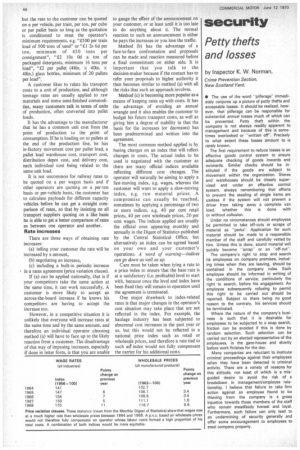security
Page 48

If you've noticed an error in this article please click here to report it so we can fix it.
Petty thefts and losses
by Inspector K. W. Norman,
Crime Prevention Section, New Scotland Yard.
• The use of the word "pilferage" immediately conjures up a picture of petty thefts and acceptable losses. It should be realized, how ever, that pilferage can be responsible for substantial annual losses much of which can be prevented. Petty theft within the company is not always readily apparent to management and because of this is sometimes overlooked or "written off". Precisely to what extent these losses amount to is rarely known.
The first requirement to reduce losses is an effective goods control system to ensure adequate checking of goods inwards and outwards. Similar checks should be instituted if the goods are subject to movement within the organization. Stores and warehouses should be closely supervised and under an effective control system, always remembering that efforts to prevent the stealing of single items are useless if the system will not prevent a driver from taking away a complete van load, whether this is done with or without collusion.
Under no circumstances should employees be permitted to take off-cuts or scraps of
material as "perks". Application for such
material should be made to a responsible member of the staff and carefully vetted by him. Unless this is done, sound material will quickly become "scrap" or an "off-cut". The company's right to stop and search its employees on company premises, includ ing times when they are leaving, should bp -contained in the company rules. Each employee should be informed in writing of the conditions of service, particularly the right to search, before his engagement. An employee subsequently refusing to permit this right to be carried out should be reported. Subject to there being no good reason to the contrary, his services should be terminated.
Where the nature of the company's business is such that it is desirable for employees to be subjected to a snap search, friction can be avoided if this is done by random selection. Such selection can be carried out by an elected representative of the employees, in the gate-house and shortly before work finishes for the day.
Many companies are reluctant to institutecriminal proceedings against their employees
when they have been detected in criminal activity. There are a variety of reasons for this attitude, not least of which is a mis guided desire to avoid the risk of a breakdown in management/employee relationship. I believe that failure to take firm action against an employee found to be thieving from the company is a gross injustice towards those members of the staff who remain steadfastly honest and loyal. Furthermore, such failure can only lead to an undermining of security generally and offer some encouragement to employees to steal company property.
























































































































